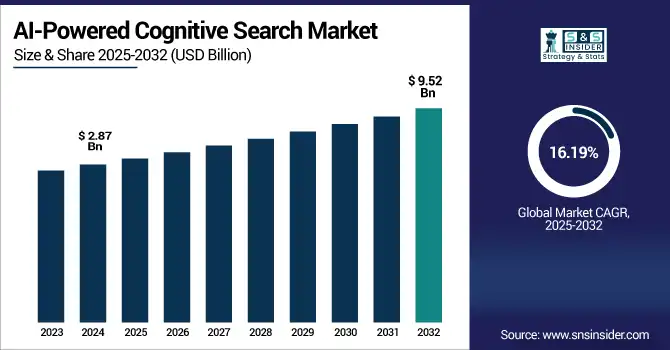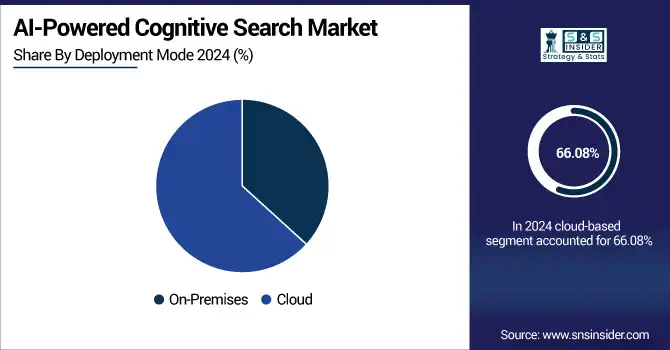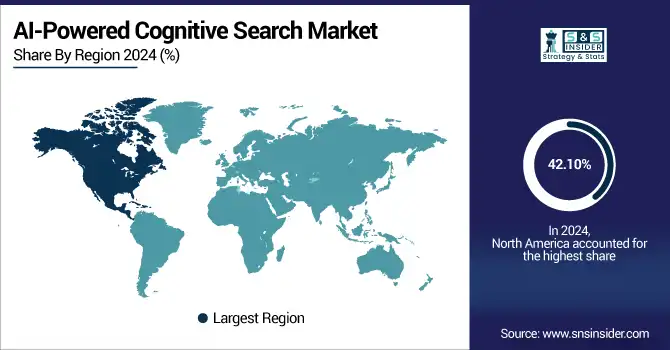AI-Powered Cognitive Search Market Report Scope & Overview:
The AI-Powered Cognitive Search Market size was valued at USD 2.87 billion in 2024 and is expected to reach USD 9.52 billion by 2032, expanding at a CAGR of 16.19% over the forecast period of 2025-2032.

To Get more information on AI-Powered Cognitive Search Market - Request Free Sample Report
The AI-Powered Cognitive Search Market is experiencing robust growth, propelled by the need for intelligent information retrieval and enhanced decision-making across vast data landscapes. This expansion is fueled by the rising adoption of AI and machine learning, which enable personalized recommendations, dynamic tracking, and tailored content, significantly boosting user engagement. North America, particularly the U.S., currently dominates the market due while Asia Pacific is emerging as the fastest-growing region. Opportunities abound in expanding into niche markets and localized platforms, promising new avenues for growth and monetization, despite challenges related to data privacy and regulatory concerns.
According to research, global enterprise data is projected to grow by 42% annually, driving the need for AI-based cognitive tools that enhance scalability. Companies adopting these solutions report a 35% boost in user satisfaction and 28% higher content discoverability.
The U.S AI-Powered Cognitive Search Market size reached USD 0.81 billion in 2024 and is expected to reach USD 2.51 billion in 2032 at a CAGR of 15.21% from 2025 to 2032.
The U.S. leads the market, driven by its advanced digital infrastructure and mature e-commerce. As the home to major tech firms, the U.S. sees high AI adoption across industries, supported by government investment. This dominance is fueled by a surging need for transparent pricing, personalized experiences, and efficient management of vast unstructured data. Continuous advancements in AI and the ongoing digital transformation further propel the market, as businesses seek to enhance operational efficiency and consumers demand intelligent, personalized search solutions.
Market Dynamics
Drivers:
-
Increasing Adoption of AI and Personalized Recommendations Elevates Consumer Engagement and Conversion.
The main driver on the market is the rapid implementation of artificial intelligence and machine learning in search platforms. With these technologies being applied, the platforms can provide a high level of personalization, dynamically tracking prices and content based on the customer’s behaviors and preferences. Enabling more personalization on the platform may lead to increased satisfaction with the service provided and as a result, to increased conversion rates. The recent trends include the implementation of chatbots based on AI providing customer support in real time, creation of sophisticated pricing algorithms allowing to the prediction of future prices, and a highly personalized shopping experience based on the real-time study of users’ browsing history. Major players are continuously investing in data analysis to refine these algorithms, ensuring faster and more precise comparisons, which not only simplifies usage but also creates a competitive edge.
Restraint
-
Data Privacy and Regulatory Concerns Impede Platform Scalability and User Trust.
The dominating force in the market is the rapid incorporation of artificial intelligence and machine learning into search platforms. Their innovative technologies provide users with highly tailored experiences, where the systems dynamically track prices and adjust what customers see to their behaviors and preferences. As a result, personalization significantly increases user satisfaction and directly contributes to usage. Some of the recent trends include AI-driven chatbots enabling instant customer service and sales solutions, predictive pricing methods, and solutions that offer real-time personalization based on the user’s browsing history, purchase history, and purchases on similar items.
Opportunity
-
Expansion into Niche Markets and Localized Platforms Unlocks New Avenues for Growth.
A substantial opportunity lies in targeting specialized niche markets and developing region-specific platforms tailored to local preferences and languages. As consumer demands diversify beyond mainstream categories, cognitive search tools can tap into emerging segments like sustainable products, specialized healthcare services, educational resources, and unique regional goods. Recent trends indicate a rise in hyperlocal platforms offering comparisons in local currencies and integrating with specific vendor networks. Companies are also implementing voice search and multilingual support to effectively reach non-English-speaking markets.
Challenge
-
Maintaining Real-Time Accuracy Across Numerous Retailers Poses Significant Operational Hurdles.
One of the foremost challenges for cognitive search platforms involves sustaining real-time accuracy of information across a vast and constantly evolving ecosystem of retailers and products. Keeping prices, inventory levels, and product features consistently up-to-date demands seamless integration with diverse data sources and robust, high-performance infrastructure. Even minor delays or inaccuracies can severely erode user trust and damage brand credibility. The necessity of integrating with numerous APIs, web scraping tools, payment gateways, and discount rules adds immense technical complexity and operational expense. This intricate web of integrations presents substantial barriers to achieving broad scalability and unwavering dependability in the market.
Segment Analysis
By Deployment Mode
The Cloud segment holds the largest revenue share in the AI-Powered Cognitive Search Market, accounting for 63.26% in 2024. Venues such as Coveo also constantly upgrade their cloud-native cognitive search platforms to provide unrivaled integration with multiple enterprise systems and utilize AI for intelligent search and personalization at scale. IBM Watson Discovery also offers cloud-based AI search functionality, allowing businesses to unlock insights from unstructured content. The driver for the segment is the growth in adoption of cloud-first tactics among businesses looking for lower infrastructure overhead, faster deployment, and quick access to new AI breakthroughs without needing enormous initial investment.
The On-Premises segment is experiencing the largest CAGR at 16.92% within the forecasted period, despite its smaller current revenue share. This growth is driven by the critical need for heightened data security, strict regulatory compliance, and complete control over sensitive information, particularly for organizations in heavily regulated industries. Companies like Sinequa offer robust on-premises cognitive search solutions that provide enterprises with granular control over their data and search infrastructure, a vital factor for sectors handling confidential customer or proprietary information. Recent product developments include enhanced security features and improved integration capabilities with existing on-premises IT ecosystems.

By Enterprise Size
The Large Enterprises segment commands the largest revenue share in the AI-Powered Cognitive Search Market, at 42.18% in 2024. This dominance is primarily driven by the sheer volume and complexity of data that large organizations manage, coupled with their substantial budgets for advanced technological solutions. Companies like Microsoft with Azure Cognitive Search and Google Cloud with their Vertex AI Search are continually launching features tailored for enterprise-grade scalability, robust security, and deep integration into existing complex IT infrastructures. The main driver is the critical need for large organizations to effectively manage, analyze, and retrieve information from their extensive and diverse data repositories to maintain a competitive edge.
The Small and Medium Enterprises (SMEs) segment is growing at the largest CAGR of 16.55% within the forecasted period in the AI-Powered Cognitive Search Market. This accelerated growth is driven by the increasing accessibility and affordability of cloud-based cognitive search solutions, coupled with a growing awareness among SMEs of the competitive advantages offered by AI. Companies like Attivio and Mindbreeze are developing more streamlined and cost-effective AI search platforms designed specifically for the needs of SMEs, allowing them to leverage sophisticated capabilities typically reserved for larger corporations.
By End-User
The IT and Telecommunications segment holds the largest revenue share in the AI-Powered Cognitive Search Market, accounting for 35.01% in 2024. This leadership is driven by the immense volume of diverse data generated within these sectors, from customer interactions and network logs to code repositories and technical documentation, necessitating advanced search capabilities for efficient information retrieval. Companies like Squirro provide AI-driven insights platforms that are critical for IT operations, predictive maintenance, and enhancing telecommunication customer service. The main driver for this segment is the continuous demand for enhanced operational efficiency, streamlined data management, and faster problem resolution in complex technical environments.
The Healthcare segment is growing at the largest CAGR of 18.12% within the forecasted period in the AI-Powered Cognitive Search Market. This rapid growth is driven by the sector's critical need to extract actionable insights from vast amounts of unstructured clinical data, medical research, and patient records for improved diagnostics, personalized treatment, and operational efficiency. Organizations such as PerkinElmer Informatics, now a part of Revvity, and others are utilizing AI to let researchers and clinicians find the required medical data, analyze patient statistics, and discover drugs more quickly. The driving force for the latter is a growing need to use data to improve patient conditions, expedite research, and be in line with the existing requirements.
Regional Analysis
North America holds a dominant position in the AI-Powered Cognitive Search Market, accounting for 43.28% of the market share. This leadership stems from its highly developed digital infrastructure, extensive adoption of advanced technologies, and a mature ecosystem for e-commerce and enterprise software. The region consistently invests in AI research and development, driving innovation in cognitive search solutions.
The U.S. significantly dominates the North American market. This is due to its substantial technology investment, large enterprise base with complex data needs, and a high rate of AI solution adoption across critical sectors.
Europe represents a significant segment in the AI-Powered Cognitive Search Market, demonstrating steady growth driven by increasing digital transformation initiatives and a strong focus on data governance and compliance. Enterprises across various industries are adopting cognitive search to enhance operational efficiency and leverage insights from their expanding digital data. The region's regulatory environment also influences deployment strategies.
The UK is a key player dominating the European market. Its strength lies in a mature digital economy, substantial investment in enterprise AI solutions, and a strong presence of companies that require advanced search capabilities for vast information repositories.
Asia Pacific is the fastest-growing region in the AI-Powered Cognitive Search Market, expanding at a remarkable rate of 17.06%. This rapid growth is fueled by surging internet and smartphone penetration, a burgeoning digital economy, and increasing investment in AI across diverse industries. The region's large and diverse consumer base and evolving enterprise needs are driving significant demand for advanced search solutions.
China leads the Asia Pacific market. Its dominance is powered by a massive digital user base, aggressive government support for AI and digital economy initiatives, and rapid advancements in cloud infrastructure and AI application development.
The Middle East & Africa and Latin America regions are both experiencing consistent growth in the AI-Powered Cognitive Search Market, driven by ongoing digital transformation, improving IT infrastructure, and rising cloud adoption. Businesses in these areas seek to optimize operations and enhance decision-making through intelligent information retrieval. The UAE leads MEA with progressive digitalization, while Brazil spearheads Latin America due to its large economy and growing tech investments.

Get Customized Report as per Your Business Requirement - Enquiry Now
Key Players
The major players of the AI-Powered Cognitive Search Market are IBM Watson, Coveo, Attivio, Lucidworks, Mindbreeze, Sinequa, Micro Focus, Squirro, PerkinElmer, BA Insight, BMC Software and others,
Key Developments
-
In May 2025, IBM partnered with ABB to integrate Watson’s AI for real-time defect detection in manufacturing, highlighting a strategic move toward expanding AI-powered cognitive solutions in industrial settings.
-
In December 2024, ChapsVision acquired AI search specialist Sinequa, strengthening its enterprise search and Retrieval-Augmented Generation (RAG) capabilities, while also securing approximately $90 million in new funding to accelerate growth and innovation in cognitive search solutions.
| Report Attributes | Details |
|---|---|
| Market Size in 2024 | USD 2.87 Billion |
| Market Size by 2032 | USD 9.52 Billion |
| CAGR | CAGR of 16.19% From 2025 to 2032 |
| Base Year | 2024 |
| Forecast Period | 2025-2032 |
| Historical Data | 2021-2023 |
| Report Scope & Coverage | Market Size, Segments Analysis, Competitive Landscape, Regional Analysis, DROC & SWOT Analysis, Forecast Outlook |
| Key Segments | •By Deployment Mode (On-Premises, Cloud) •By Enterprise Size (Small and Medium Enterprises, Large Enterprises) •By End-User (BFSI, Healthcare, Retail and E-commerce, Media and Entertainment, IT and Telecommunications, Others) |
| Regional Analysis/Coverage | North America (US, Canada, Mexico), Europe (Germany, France, UK, Italy, Spain, Poland, Turkey, Rest of Europe), Asia Pacific (China, India, Japan, South Korea, Singapore, Australia, Rest of Asia Pacific), Middle East & Africa (UAE, Saudi Arabia, Qatar, South Africa, Rest of Middle East & Africa), Latin America (Brazil, Argentina, Rest of Latin America) |
| Company Profiles | IBM Watson, Coveo, Attivio, Lucidworks, Mindbreeze, Sinequa, Micro Focus, Squirro, PerkinElmer, BA Insight, BMC Software |

